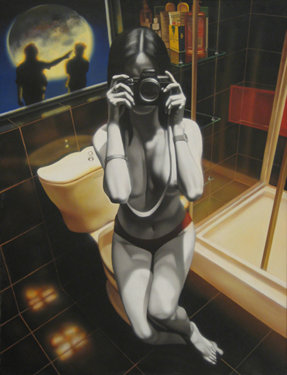‘We participate in a tragedy; at a comedy we only look.’ –Aldous Huxley

The average American, according to the Clean Air Council, creates 4.6 pounds of trash per day. Much of the trash is non-biodegradable, meaning that it will accumulate, and not necessarily where we’d like it to, if left unchecked.
Californians Against Waste estimates that Americans consume some 84 billion plastic bags a year (the product of roughly 12 million barrels of oil)—many of which, along with many other forms of terrestrial waste, are collecting in an area in the northern Pacific Ocean known as the Eastern Garbage Patch, a floating mass now more than twice the size of Texas.
The mandate of consumerism requires a certain amnesia about what we waste: It encourages us to forget the old and buy the new. Confronting the physical reality of our waste, however, might force a reexamination of our relationship to rampant consumerism.
The sudden interest in found-object art at the recent exhibitions seemed to suggest that the art world was prepared to encourage precisely that sort of reexamination —or so I thought before I actually attended them. (…)
What, however, is one to make of Richard Prince’s pieces, around the corner from Arman’s? The photographs are of Marlboro ads, carefully cropped to remove any ad copy. Prince argues that the iconic Marlboro cowboy, when removed from its original advertising context, encapsulates a certain segment of the American mythos. Perhaps, but the images never are removed from their advertising context—Marlboro’s images are enough of a cultural mainstay that we’re perfectly capable of identifying them without the Marlboro logo. The brand is far stronger than Prince’s effort at artistic dislocation. The primary effect of Prince’s appropriation, rather than rescuing our detritus from obscurity, is merely to extend the reach of advertising into the gallery and the museum. One can hardly claim this is a radical political act, certainly not one that runs counter to consumerism.
somehow related { Damien Hirst, Appropriation | Wikipedia }
painting { Zhong Biao, Dark Lens, 2002 }


